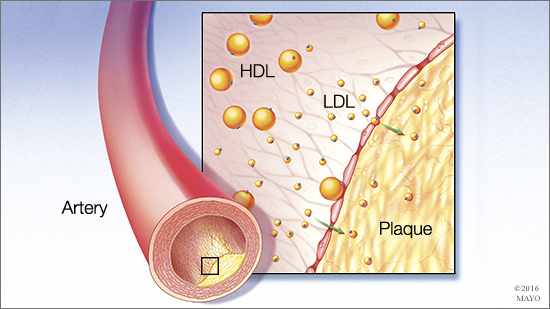DEAR MAYO CLINIC: My grandson is 11 and already has high cholesterol. He does not eat a lot of junk food and plays many sports, but we do have high cholesterol in our family. Could this be hereditary, and, if so, is it common to show up in such a young person?
ANSWER: High cholesterol certainly can be genetic, and it may show up at an early age in some people. Although your grandson can’t do anything about his genetics, he can make lifestyle choices to help manage his cholesterol. If that isn’t enough, then medication to help control cholesterol may be an option, too.
Cholesterol is a waxy substance found within the fats, or lipids, in blood. Cholesterol is carried through the blood attached to proteins. This combination of proteins and cholesterol is called a lipoprotein. You may have heard of different kinds of cholesterol. They are based on what type of cholesterol the lipoprotein carries. Low-density lipoprotein, or LDL, is sometimes called bad cholesterol. It transports cholesterol particles throughout the body. LDL cholesterol builds up on the walls of the arteries, making them hard and narrow. High-density lipoprotein, or HDL, is considered good cholesterol. It picks up excess cholesterol and takes it back to the liver.
While the body needs some cholesterol to build healthy cells, having too much cholesterol can raise a person’s risk for heart disease. High cholesterol, particularly high levels of LDL, can lead to the development of fatty deposits in blood vessels. Eventually, these deposits can make it hard for blood to flow through the arteries. When that happens, the heart may not get as much oxygen-rich blood as it needs. That raises the risk of a heart attack. If blood flow to the brain is reduced, that can cause a stroke.
High cholesterol does have a tendency to run in families, and genetics play a role in a person’s risk for developing high cholesterol. For example, genetic makeup may keep cells from effectively removing LDL cholesterol from the blood or cause the liver to produce too much cholesterol.
When a young person, such as your grandson, has high cholesterol, the first steps to help control cholesterol usually involve lifestyle changes. Getting regular exercise and staying at a healthy weight both can go a long way to managing cholesterol levels. It sounds like your grandson is already active in sports. He should continue those activities, with a goal of getting at least 30 minutes of exercise a day. He also should limit the amount of time he spends in front of computers, tablets, televisions and phones.
Eating a healthy diet is also important for cholesterol control. Working with a dietitian can be very useful for families who have children dealing with high cholesterol. A dietitian can assess your grandson’s eating habits and recommend changes, such as avoiding processed foods that contain large amounts of saturated fats and sugars, for example. The dietitian also can offer ideas for healthy food choices and recipes for the entire family.
In some cases, lifestyle changes may not be enough to keep cholesterol in check, and medication is necessary to bring cholesterol down to a healthy level. It is important to lower high cholesterol in children, because, if left untreated, high cholesterol eventually can lead to narrowed and hardened arteries, increasing the risk of serious health problems later in life. — Dr. Aida Lteif, Pediatric Endocrinology and Metabolism, Mayo Clinic, Rochester, Minnesota








